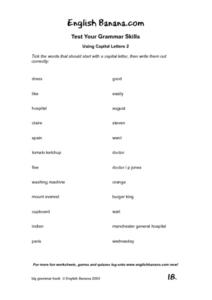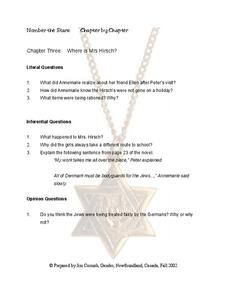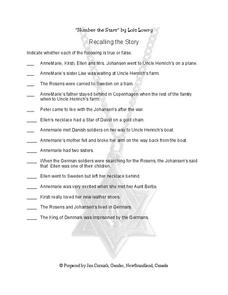Curated OER
Comparatives and Superlatives 4
In this language arts worksheet, students learn the comparative and superlative forms of 10 adjectives. Students write the appropriate form of the adjectives, spelling them correctly on the lines. Example: dirty (dirtier, dirtiest).
Curated OER
Descriptions of People-- Draw a Picture
In this language arts worksheet, students learn that clear written descriptions can paint a picture in the reader's mind. Kids read 5 descriptions of people and draw a picture of each. Students then draw 5 more people and write their own...
Curated OER
Describing People 1
In this language arts activity, students read 5 detailed descriptions of people. Students draw a picture of each of the people described. Students then draw 5 more people and write their own description of each one.
Curated OER
Which Comic Strip Character is Like You?
For this language arts worksheet, students examine the comic pages of a newspaper. Students find a character like them in some way and answer 4 questions.
Curated OER
Nouns and Verbs
In this language arts learning exercise, students discover that some words can be used as both nouns and verbs. Students look at 10 words and write sentences using them as both nouns and verbs. Example: smell
Curated OER
Punctuation Marks 2- Test Your Spelling Skills
In this language arts worksheet, students solve anagram puzzles to determine the names of punctuation marks that are shown a the top of the page. They write the names on 10 blank lines at the bottom half of the page.
Curated OER
Question Forms Using Verb "to do" as an Auxiliary Verb (Present Simple Tense) 3
In this language arts worksheet, students analyze 10 sentences which have the words in scrambled order. Students rearrange the words to make a question using the verb "to do." Example: you do OK feel (Do you feel OK?)
Curated OER
Question Forms Using Verb "to do" as an Auxiliary Verb (Present Simple Tense) 1
For this language arts worksheet, students examine 10 sentences which are scrambled. Students rearrange the words to make each question correct, using the verb form of "to do." Example: do you how do (How do you do?)
Curated OER
Question Forms Using Verb "to have" as an Auxiliary Verb (Present Perfect Tense) 2
In this language arts worksheet, students examine 10 scrambled sentences. Students rearrange the words to make a questions using verb "to have" as an auxiliary verb in the present perfect tense. Example: you her have before been (Have...
Curated OER
Question Forms Using Verb "to have" as an Auxiliary Verb (Present Perfect Tense) 3
In this language arts worksheet, students examine 10 sentences which are scrambled. Students rearrange the words in each sentence to make a question using verb "to have" as an auxiliary verb in the present perfect tense. Example: when...
Curated OER
Using Capital Letters 2
In this language arts worksheet, students examine a list of 30 mixed common and proper nouns. Students indicate which words should be capitalized and write them out correctly.
Curated OER
Using Capital Letters 1
In this language arts worksheet, students analyze a list of 30 mixed common and proper nouns. Students mark which words should start with a capital letter and write them out correctly.
Curated OER
A School Trip to Paris-- Using Modal Verbs
In this language arts worksheet, learners imagine they are going on a school trip to Paris, France for 2 weeks. Students make notes in the labeled boxes of all the things they "might, could, should, must, can, will" do while they are there.
Curated OER
Bank On It! Martin Luther King, Jr.
For this language arts worksheet, students read a non-fiction article about Martin Luther King, Jr. They fill in blanks in the story with words from a word bank.
Curated OER
Number the Stars Chapter 16
In this Language Arts activity, students answer three questions from Number the Starts, Chapter 16. The questions include one literal question, one inferential, and one opinion question.
Curated OER
Number the Stars Chapter 2
In this Language Arts worksheet, students answer three questions from Number the Stars, Chapter 2. The questions include 3 literal, 4 inferential, and 2 opinion questions.
Curated OER
Number the Stars Chapter 3
For this Language Arts worksheet, students answer three questions from Number the Stars, Chapter 2. The questions include 3 literal, 3 inferential, and 1 opinion question.
Curated OER
Number the Stars Chapter 4
In this Language Arts worksheet, students answer three questions from Number the Stars, Chapter 2. The questions include 3 literal, 2 inferential, and 2 opinion questions.
Curated OER
Number the Stars Chapter 5
In this Language Arts worksheet, learners answer three questions from Number the Stars, Chapter 2. The questions include 6 literal, 1 inferential, and 3 opinion questions.
Curated OER
Number the Stars
In this Language Arts activity, students read a quote from the book Number the Stars about Ellen's necklace. Students also read a description of the meaning of the Star of David.
Curated OER
Number the Stars Activities
In this Language Arts activity, students participate in a variety of activities related to the novel Number the Stars. For example, students write a list of words form the book in alphabetical order and complete a star-shaped word search.
Curated OER
Home Child Chapter 13
In this Language Arts worksheet, students answer two questions about the novel Home Child. The questions are related to the turning point in Chapter 13.
Curated OER
Hope Child Surviving Against All Odds
In this Language Arts worksheet, students answer 2 questions about the theme of surviving against all odds in the novel Hope Child.
Other popular searches
- 5th Grade Language Arts
- 3rd Grade Language Arts
- 4th Grade Language Arts
- Second Grade Language Arts
- English Language Arts
- 1st Grade Language Arts
- Kindergarten Language Arts
- Language Arts Jeopardy Game
- First Grade Language Arts
- Language Arts School Projects
- Language Arts Lesson Plans
- Language Arts Games























